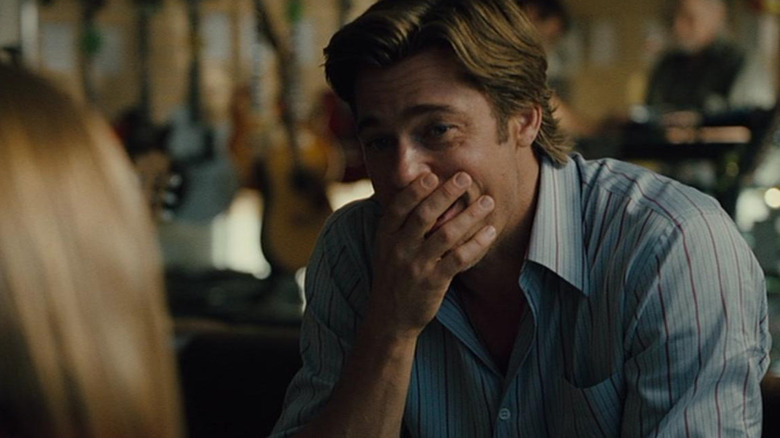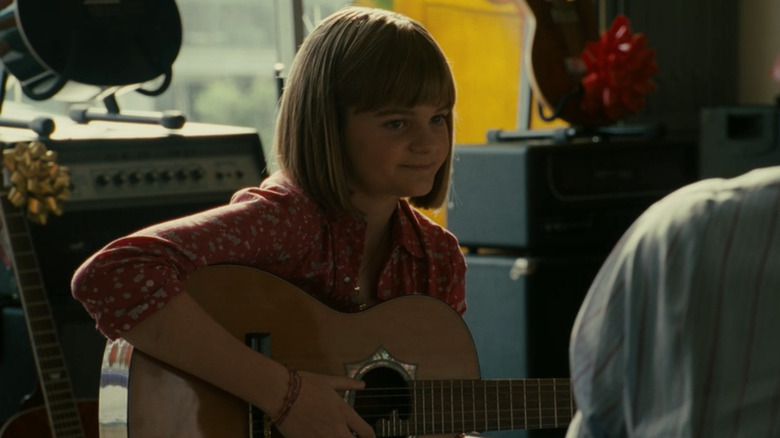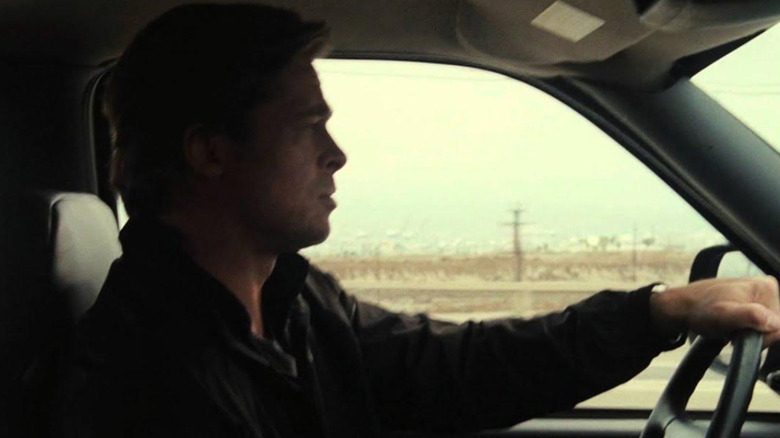One Detail In Brad Pitt's Moneyball Makes No Sense
Capturing an entire movement on-screen is hard work, and by distilling a major story down to a two hour movie, you can often compromise the smaller details. So how do you tell a complex story in a short amount of time, in a way that the audience feels good leaving the theater? For "Moneyball," the equation at play involves casting fan-favorite actors, almost backgrounding the actual baseball action, and stepping up the interpersonal dynamics that really propel a large-scale organization. Most of those decisions paid off for the movie in a massive way, but there's one small problem with "Moneyball" that movie fans may consistently scratch their heads over when revisiting the classic sports movie: The song that young actor Kerris Dorsey sings in "Moneyball" makes no sense when you really think about it!
For the uninitiated, "Moneyball" is a 2011 movie that adapts Michael Lewis's beloved 2003 book of the same name. It's a baseball sports film that fans of the genre and the game hold in high regard. "Moneyball" chronicles the rise of Oakland Athletics' Major League Baseball manager Billy Beane and his choice to lean into sabermetrics, aka sports analytics, to create a winning team, despite financial hurdles in the 2002 baseball season. Brad Pitt plays Billy Beane, who builds a baseball roster in an unconventional way while trying to navigate his changing relationship with his ex-wife Sharon and estranged daughter Casey, played by Kerris Dorsey. During an emotional scene in the film, Casey sings "The Show" by Lenka, which seems innocuous and sweet enough — but there's just one problem with that.
In case you aren't up to snuff on your 2000s-era music, Lenka didn't release 'The Show" until 2008, which is years later than the year "Moneyball" is set in. For a movie that took such pride in recalling baseball stars of yesteryear and accurately representing the true story, it's a strange choice. However, it makes a bit of sense when you think about the entire process of making a movie.
Moneyball's emotional song mixup stems from a common filmmaking problem
"Moneyball" might not feel like it, but it is set in a distinct period in time. In fact, Michael Lewis' original book is an effort to capture what Major League Baseball was as we went into the '00s in earnest. As you learn in the movie and the book, sabermetrics weren't going anywhere, and the entire league would look at what Billy Beane did and implement their own versions of the Oakland Athletics' approach for themselves. (Hysterically, the team that tries to poach Beane away near the end of the movie, the Boston Red Sox, used his methods to claim the 2004 World Series two years later!) So there's a clear before and after period at play here, which means you're trying to nostalgically capture some of that previous era, despite that being against the text of the film, weirdly enough.
In essence: what feels like the previous decade to someone sitting at the tail end of it? In this case, Lenka's "The Show" actually nails that '00s vibe that a lot of popular culture has found its way back to recently, and that means "Moneyball" might have been onto something! But, upon the movie's release in 2011, there wasn't enough distance for those signifiers to make as much sense as now. There's also the fact that some of the lyrics mirror Beane, as constructed by this film, being caught between tradition and the future, which also reflects where his daughter Casey is coming from as well. The song just kind of thematically works, and we have to let the emotion carry us instead of worrying about logic, kind of like how a "traditional" baseball scout would look at some problems in the film. How about that?
It's about the love of the game
Nostalgia is a massive force in our current entertainment climate, from massive live-action remakes, to movies adopting old visual styles, it's really all around us. The kind of emotional connection human memory can inspire is hard to kick, and it might even be part of what makes us fully-formed people. But our memories are slippery and untrustworthy at the best of times, emotional judgements can be blurry, and moves that seem logical in the moment can go awry very easily. Despite trying to evoke feelings with cinema, directors can sometimes lose sight of historical accuracy, and all it takes is one misplaced PlayStation Portable to pull the bottom block out of the Jenga tower holding an entire fictional world together.
Baseball actively wraps itself in nostalgia though, and that fact makes it feel kind of fitting that a major entry in the sports movie canon got such an interesting detail wrong. Michael Lewis is shaping a narrative in the book "Moneyball," and the film is doing similar work, as this is not a documentary. Rather, it's trying to tell the slightly glossy story of some nerd sucking the magic out of a game through cold hard math — or maybe it's some light revisionist history about how some old dinosaurs never saw the meteor coming until this first fossil looked up and realized what was on the way.
At any rate, one weird song choice doesn't ruin the whole film, and I might argue it illuminates how emotion can take over logic, because that's what happened to the Oakland Athletics, and that's what happens in baseball.
If you like "Moneyball," there are plenty of other great movies just like it that you should watch.


